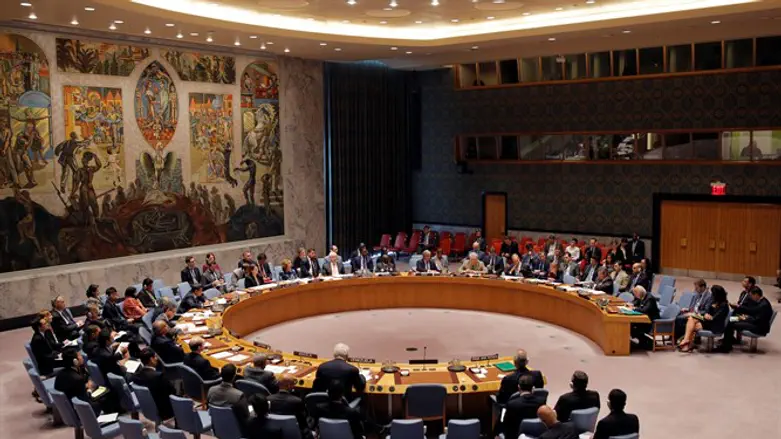
The UN Security Council on Wednesday met behind closed doors to discuss Israel's approval of new homes in Judea and Samaria, but took no action on the matter, AFP reports.
Council members heard a report from UN envoy Nickolay Mladenov after the Israeli government approved 2,500 new homes in Judea and Samaria on Tuesday.
The announcement followed the approval earlier this week of 566 new housing units in the Jerusalem neighborhoods of Ramat Shlomo, Ramot, and Pisgat Ze'ev.
The “settlement building needs to be condemned," Swedish Ambassador Olof Skoog told reporters after the closed council meeting.
"We believe that any action that is taken in violation of international law or Security Council Resolution 2334, regardless of who violates that resolution, needs to be condemned," he said, referring to the anti-Israel resolution passed by the Security Council last month.
The ambassador, who holds the council presidency this month, said council members received an update of the situation but that no one pushed for immediate action during the talks, requested by Bolivia.
Incoming U.S. Ambassador Nikki Haley, confirmed to the post this week, did not speak at Wednesday’s meeting and has yet to present her credentials to UN Secretary General Antonio Guterres.
The Palestinian Authority (PA) envoy to the UN, Riyad Mansour, told reporters the council must ensure that its own resolutions are upheld and that Israel must not be allowed to "get away with it" by building more “settlements.”
The Swedish ambassador said that despite taking no immediate action, "everyone in the council that spoke today is eager to make sure we find ways to minimize the effects of unilateral action."
Guterres is due to follow up on Resolution 2334 in March by reporting to the council on Israeli activity in Judea and Samaria, noted AFP.
The Security Council meeting came a day after the United Nations denounced the Israeli construction as “unilateral actions” which place an obstacle in the way of the two-state solution.
"For the secretary general, there is no plan B for the two-state solution," UN spokesman Stephane Dujarric said.
Meanwhile, White House spokesman Sean Spicer on Tuesday declined to express a position on Israeli construction when asked about it in his daily press briefing.
"Israel continues to be a huge ally of the United States," Spicer said, when asked about Trump's perspective on the Israeli plan to implement the construction plans.
"He wants to grow closer to Israel to make sure it gets the full respect in the Middle East," he continued. "We'll have a conversation with the prime minister."